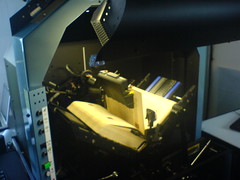Who supports and who opposes the Google Books settlement
By Kristopher A. Nelson
in
February 2010
500 words / 2 min.
Tweet
Share
At the Google Books fairness hearing, who supports and who opposes the settlement?
Please note that this post is from 2010. Evaluate with care and in light of later events.
Norman Oder of the Library Journal is covering the Google Books fairness hearing, being held today. I found the list of opponents and supporters appearing at the hearing particularly interesting.
Opponents include “Microsoft; Amazon.com; the Open Book Alliance; American Society of Journalists and Authors; Pamela Samuelson, University of California, Berkeley, law professor; Cindy Coh on behalf of the ‘Privacy Authors and Publishers;’ representatives of Japanese and New Zealand authors; representatives of France and Germany; Consumer Watchdog; and the Internet Archive.”
Oder adds:
Two of the 21 have dropped out, but two have been added. The state of Pennsylvania, also representing Massachusetts and Washington, will now be included; the states object to the provision for unclaimed funds. Also added is the literary agency Writers Representatives LLC, which objects on a wide variety of grounds.
It will be interesting to see exactly what arguments opponents make in court (they have roughly 5 minutes to present their points orally). Looking them over, it appears that, generally, opponents are invested more in the current rewards system for successful IP owners, although the inclusion of the Internet Archive and the Consumer Watchdog suggests this is not the complete story. The Internet Archive, for example, is worried about the Settlement favoring a single company (Google), as opposed to wanting to preserve the status quo — at least from what I gather so far.
Supporters include “Center for Democracy & Technology; the National Federation of the Blind; Sony; The Institute of Intellectual Property & Social Justice at the Howard University School of Law; and University of Michigan Librarian Paul Courant, who represents Google's first library scanning partner.”
 It’s interesting to see Sony on this list, but then again, Sony has hardly benefited from the current publishing structure, as far as I can determine, so perhaps opening up access via Google (with whom they can partner, perhaps) would potentially benefit their e-reader plans.
It’s interesting to see Sony on this list, but then again, Sony has hardly benefited from the current publishing structure, as far as I can determine, so perhaps opening up access via Google (with whom they can partner, perhaps) would potentially benefit their e-reader plans.
The Center for Democracy & Technology generally speaks for the opening up of government and the protection of civil liberties, so it’s interesting to see that they support the settlement. The National Federation of the Blind makes sense, especially given current publishers tendencies to drag their feet on making electronic texts available, even to the blind. The only library representative, from hat I can tell, is a librarian from the University of Michigan.
I’ll be curious to see the succinct version of the arguments each makes in court — such a condensed time for oral argument generally means that only the most important points (as determined by the speaker) get highlighted.